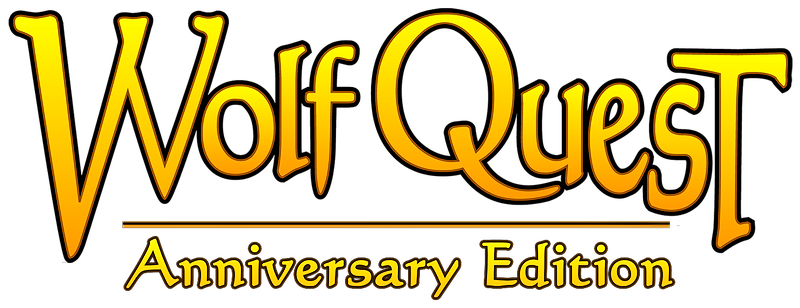Every wolf's life is about this one thing: passing on your genes to the next generation. Your pups' survival — and the survival of your genetic code — is your primary goal in life.
In the American West, wolf pups are typically born in mid-April. They spend the first four weeks in the den, then emerge and begin exploring their world and gaining survival skills.
LITTER SIZE AND PUP DEATHS
As with many wild animals, young wolves are not guaranteed to survive their first year of life, so wolf parents produced large litters, in hopes that a few will live long enough to reproduce and carry on the genetic line.
WolfQuest simulates this phenomenon. On default settings, wolves can have up to seven pups in a litter, but only rarely, with a combination of luck and skill, do all those pups survive to become yearlings. Many threats can take the lives of pups. Hunger, competitor attacks, sickness, and random quirks of fate and bad luck. Skillful players can thwart some of these: keep starvation at bay by bringing enough food back to pups, and chasing off predators who seek to reduce competition by killing your pups. But some fates are partially or completely out of the player's control: dying from sickness and the occasional chance of wandering off thoughtlessly and meeting an unknown fate.
For player who prefer their pups not suffer from random fates, the "Pup RNG Death" pulldown in Game Settings offers several options. This controls random (RNG=Random Number Generator) deaths for pups. Because some options prevent some types of death, the maximum litter size is reduced (and thus, these settings only affect future litters, not the current pups of the year). There are three choices with this setting:
* All Types: Pups can die of sickness and can also possibly get lost and meet unknown fates. Maximum litter size on this setting is seven.
* Sickness Only: Pups can die of sickness but not unknown fates. Maximum litter size is six.
* None: Pups cannot die of sickness or unknown fates. Maximum litter size is five.
PUP SICKNESS
Sickness is a dynamic system which uses complex rules and periodic "rolls of the dice" to ensure that some pups fall sick over the course of the summer while preventing sickness from wiping out an entire litter.
- Pups get sick occasionally. With regular types of sickness, if a pup is low on health at the onset of sickness (or takes damage when sick), it's more likely to die. You can increase the pup's chances with Companionship (spending time with the pup). Each moment of Companionship boosts the odds of recovery a little bit (how much varies from sickness to sickness). Gray pups are somewhat more likely than black pups to die from sickness (except for KK black pups, who are very likely to die from sickness).
- Fast sickness is a special kind of sickness, in which the pup loses health rapidly. Hungry pups are more likely to get this kind of sickness. High initial health and Companionship can help increase the odds of recovery, but the odds are against you.
BAD SHAPE
Sickness weakens pups, so they are slow to stand up, and they walk slowly and painfully rather than their usual spritely trot. When their health drops below 15%, they will refuse to eat.
Even when not sick, pups whose health drops below 15% will move slowly and painfully.
PUP XP
From the moment they emerge from the den, pups begin gaining experience (XP) by observing the world and interacting with it. During the first few months of life, this occurs naturally through exploration and play activities.
In late summer, during the Growing Pups quest, pups' predator drive grows stronger. Pups will gain XP by chasing tiny prey such as voles and Uinta ground squirrels. Give them the freedom to do so (rather than keeping them in the safety of tall grass patches) so they have more XP when they begin hunting big prey.
In fall, pups are big enough to hunt elk and other ungulates. Initially they are cautious and will gain XP by observing their parents and packmates hunt. Gradually, they will grow bolder and take quick bites. Eventually, they are skilled enough that observation alone does not increase XP. From then on (around 80% XP), encourage them to attack and bite prey to keep gaining experience.
DISPERSING
Pups stay in their natal (birth) pack until they are old enough to disperse and find or form a pack of their own. Some pups disperse as yearlings, but most wait until they are age two or older. As subordinates in their family pack, they can help with hunting and pupcare. Eventually, almost every surviving pup will disperse to make their own way in the world. They make this decision on their own, based on their age and personality, the current season, and their mood. When one disperses, one or two siblings might decide to join them -- it's much easier to hunt and survive in a group than alone.
When one or more pups disperse, you can spin off a new game with that pup as the player-wolf in the same game-world (to play now or later). This save will retain the current situation with rival wolves and territories, and the player's pack will become a rival pack. You can also turn this dispersed pup into a playable wolf later, in the Family Tree in the main menu.
Some subordinates may even stay around in hopes of inheriting the pack when their parent dies. Females are more likely to stay in the pack, while males are more likely to disperse, which over time creates a matrilineal lineage.
